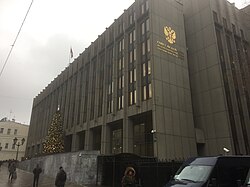Federal Assembly Федеральное собрание Federalnoye sobraniye | |
|---|---|
 | |
| Type | |
| Type | |
| Houses | Federation Council (upper house) State Duma (lower house) |
| History | |
| Founded | 12 December 1993 |
| Preceded by | Supreme Soviet of Russia Constitutional Conference of Russia |
| Leadership | |
| Structure | |
| Seats | 628
|
 | |
Federation Council political groups |
|
 | |
State Duma political groups | Government (337)
Other parties (103)
Vacant seats (10)
|
| Elections | |
| Indirect election | |
Parallel voting:
| |
Last Federation Council election | 12 December 1993 |
Last State Duma election | 17–19 September 2021 |
Next State Duma election | Before 20 September 2026 |
| Meeting place | |
 | |
| Federation Council Building, Moscow | |
 | |
| State Duma Building, Moscow | |
| Website | |
| Gov.ru | |
| Constitution | |
| Constitution of Russia, Chapter V, Articles 94-109 | |
| Footnotes | |
| |
The Federal Assembly [a] is the bicameral national legislature of Russia. The upper house is the Federation Council, and the lower house is the State Duma. The assembly was established by the Constitution of the Russian Federation in 1993, replacing the former Supreme Soviet of Russia. It is located in Moscow.
Contents
The Chairman of the Federation Council is the third most important position after the President and the Prime Minister. In the case that both the President and the Prime Minister are incapacitated, the Speaker of the upper house of the Russian parliament becomes Acting President of Russia. [4] [5]
The jurisdiction of the Federation Council includes: approval of changes in borders between federal subjects of Russia, approval of the presidential decree on the introduction of a martial law or on the introduction of a state of emergency, deciding on the possibility of using the Armed Forces of Russia outside the territory of Russia, appointment of elections of the President, impeachment of the President, appointment of judges of higher courts of Russia, appointment and dismissal of the Prosecutor General of Russia, appointment and dismissal of Deputy Chairman and half of the auditors of the all Accounts Chamber and others. [6]
The jurisdiction of the State Duma includes: consent to the appointment of the Prime Minister (Chairman of the Government), deciding the issue of confidence in the Government, appointment and dismissal of the Governor of the Central Bank, appointment and dismissal of the Chairman and half of the auditors of the Accounts Chamber, appointment and dismissal of the Commissioner for Human Rights, proclamation of amnesty, advancing of charges against the President for his impeachment and others. [7]
Since the 2003 elections, the Federal Assembly has been referred to by analysts and observers as being a rubber stamp institution. [8] [9] [10] [11]
